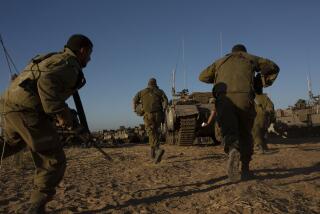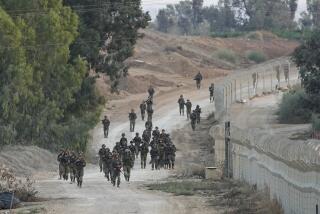Holes in War’s Strategy
- Share via
The United States and its NATO allies won the war to halt Yugoslavia’s ethnic cleansing in Kosovo, but troubling questions linger about how that campaign was fought. A final appraisal of what went right and what went wrong is due from the Pentagon soon, but some conclusions already seem clear.
For NATO, the conflict was almost entirely an air war, waged over 78 days--not the few days planners had anticipated--and with great care taken to avoid allied casualties. Many, especially in the military, believe NATO’s objectives could have been achieved far sooner had its battle planning been better and had differences among its political leaders not constrained the level of air operations for many weeks.
NATO is a coalition of democratic states, and a basic tenet of democracies is that the military must be subordinate to civilian control. That doesn’t mean, though, that the judgments of civilian leaders are invariably right. The military’s inclination, shaped by experience, is that in war the enemy should be hit as hard as possible as soon as possible. The incremental escalation of force in Kosovo, dictated largely by the reluctance of some NATO members to approve a more aggressive air campaign, might well have prolonged the conflict, at a higher cost in lives and destruction.
The strategic air war against Yugoslavia’s fuel and power supplies, transportation networks and war-related industries appears to have been effective in finally forcing President Slobodan Milosevic to withdraw his forces from Kosovo. The tactical air war, which targeted tanks, artillery and antiaircraft batteries, mainly in Kosovo, was far less so. Claims about successes against these targets seem to have been exaggerated.
The Serbs are credited with doing a masterful job of hiding their troop concentrations, camouflaging mobile weaponry and using dummy equipment to fool NATO pilots. They were helped by NATO’s decision not to let its attacking aircraft fly below 15,000 feet in its effort to avoid allied casualties. Another factor was NATO’s failure to put units on the ground to direct pilots to concealed or mobile targets. And among NATO’s biggest mistakes was ruling out the use of ground troops from the very beginning, a decision that denied military commanders a vital option and relieved Milosevic of a major worry.
Air power, directed against fixed targets, won the Kosovo war because air power was the only weapon NATO was willing to wield. But Yugoslavia’s army appears to have escaped largely intact, along with most of its equipment. And Milosevic still rules in Belgrade. At best, victory in Kosovo was an incomplete guide to what NATO should be prepared to do if ever it has to fight again.
More to Read
Sign up for Essential California
The most important California stories and recommendations in your inbox every morning.
You may occasionally receive promotional content from the Los Angeles Times.













